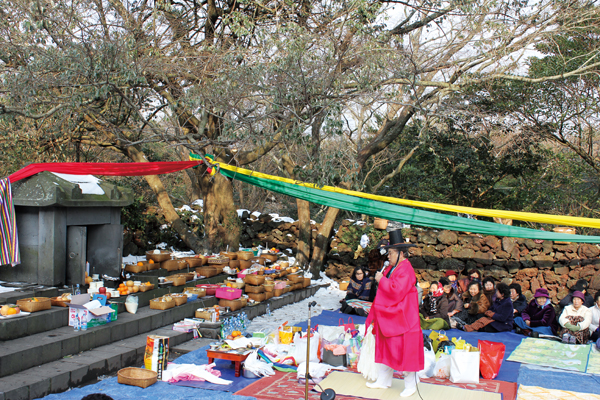
- Updated 2024.5.14 17:13
- All Articles
-
member
icon
-
facebook
cursor
-
twitter
cursor
|
TravelThings To Do |
Local village rituals aim to appease island godsIntangible cultural assets ring in the Lunar New Year |
|
| |
 |
|
| ▲ A shaman performs a Lunar New Year ritual for the village of Songdang-ri, Jeju City, on Feb. 4. Mothers and grandmothers prepare offerings with wishes for the gods to protect their family members. Photo by Angela Kim |
Between Jan. 13 and 14, following the lunar calendar (Feb. 4 and 5 on the solar calendar), village rites (maeulje in Korean) are held all over Jeju. While all of the island’s village rituals share the common background of shamanism, they can be broadly categorized into two religious processes: Confucianism, where the ritual is performed by the village’s men, and shamanisim, with the ritual being organized by women and conducted by a shaman.
On April 10, 1986, the Jeju Special Self-Governing Province chose village rites from Songdang-ri and Nabeup-ri, Jeju City, to be preserved as the island’s representative cultural assets due to their distinct characteristics.
The Songdang-ri rite was held from 7 a.m. to 1 p.m. at Dangoreum in Songdang-ri on Feb. 4. Before the ceremony began, older women brought offerings of food and drink to a stone altar. This shamanistic ceremony is devoted to Baekjutto, an agriculture goddess and also the mother of many of Jeju’s gods, “to ask the grandmother to look after us,” said Kim Ho Jong, a former village chief.
“For about a week or so, villagers devote their time to prepare their minds for the ceremony. During that time, they are not allowed to eat pork or beef. Also, they try to avoid attending funerals,” said Kim Yang Su, the village chief of Songdang-ri.
“This New Year’s ritual is the largest of the four ceremonies that the village performs throughout the year. Yet, there are many people who do not know about the process of the ceremony,” he said.
After the offerings, a designated shaman reads the names and ages of those in attendance as well as the names of their families.
“It’s like attendance at school, telling the grandmother [Baekjutto] so and so has come to meet her today,” Kim Ho Jong, the village advisor, explained.
Shortly after, the shaman communicated with the goddess and delivered the villagers’ messages and wishes. Like many rituals on Jeju, dancing followed.
“I come here every year with my daughter to ask for the safety of my family and for their health, and to prevent misfortune,” said Songdang-ri villager Won Young Kyung.
During the ceremony, buckwheat noodle soup was provided to attendees who are free to come and go at anytime during the six-hour ritual.
Unlike the ritual at Songdang-ri, the Nabeup-ri village rite follows Confucian practices and takes on a completely different form.
Held at midnight on Jan. 14 of the lunar calendar (Feb. 5 on the solar calendar), the ceremony was in honor of three gods: Toshin (the god of soil), who protects the village; Poshin, who can inflict harm upon the village, and Seoshin (the god of the west and measles).
Three days before the ritual, the 12 men who will participate in the rite gather in Geomsan Park, located behind Nabeup Elementary School, where the ceremony is held. During this period they are not allowed to eat horse meat or dog meat, and are prohibited from attending funerals as it is against custom for them to see a dead body. Also, to prevent misfortune, no one other than the selected 12 men, who must stay there for the entire duration, is allowed to enter the ceremony grounds until the ritual actually begins.
Lead by the village chief, the ceremony is very structured and more rigid than the Songdang-ri rite. Beef, vegetables, and fish are specifically arranged on a table, and the ritual begins with everyone bowing four times, then the pouring and offering of drinks to the gods, more bowing, and then finally the recital of a prayer that has been written on white paper. The ritual comes to a close with the burning of the white paper.
While the two types of rites have very distinct characteristics, Jeju villagers believe that these ceremonies foster bonding between neighbors.
|
|
|
|
|
|
|
|
|
|
|
ⓒ Jeju Weekly 2009 (http://www.jejuweekly.net)
All materials on this site are protected under the Korean Copyright Law and may not be reproduced, distributed, transmitted, displayed, published without the prior consent of Jeju Weekly. |
|
|
|
|
| Jeju-Asia's No.1 for Cruise |
|
|
|
Title:The jeju Weekly(제주위클리) | Mail to editor@jejuweekly.net | Phone: +82-64-724-7776 Fax: +82-64-724-7796
#503, 36-1, Seogwang-ro, Jeju-si, Jeju-do, Korea, 63148
Registration Number: Jeju, Ah01158(제주,아01158) | Date of Registration: November 10,2022 | Publisher&Editor : Hee Tak Ko | Youth policy: Hee Tak Ko
Copyright ⓒ 2009 All materials on this site are protected under the Korean Copyright Law and may not be reproduced, distributed, transmitted, displayed, published
without the prior consent of jeju weekly.com.

|




















